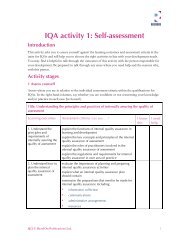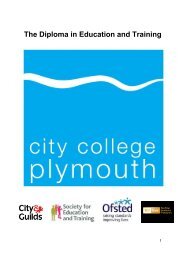IQA of Assessment Centre Handbook 2017-18_final
You also want an ePaper? Increase the reach of your titles
YUMPU automatically turns print PDFs into web optimized ePapers that Google loves.
City College Plymouth<br />
Purpose / Scope<br />
Learner Malpractice (Plagiarism and Academic Dishonesty)<br />
• This procedure is for all College learners however, HE learners and staff<br />
should also familiarise themselves with Plymouth University practice and<br />
guidance<br />
• To identify and minimise the risk <strong>of</strong> malpractice to protect the integrity <strong>of</strong> the<br />
centre and qualifications by responding to any allegations promptly and<br />
objectively<br />
• Under the Statutory Regulation <strong>of</strong> External Qualifications 2004, section 29:<br />
<strong>Centre</strong>s must inform the awarding organisation <strong>of</strong> all cases <strong>of</strong> suspected<br />
malpractice. Failure to co-operate can lead to certificates not being issued<br />
and future registrations not being accepted<br />
• Cheating during exams will be subject to the College’s Examinations Policy<br />
and procedures<br />
Definitions / Terminology<br />
Plagiarism is defined as:<br />
• Submitting someone else’s published or unpublished work, in whole, in part,<br />
or in paraphrase, as one’s own without fully and properly crediting<br />
(referencing) the author<br />
• Submitting another person’s written work as one’s own original work<br />
• Using the idea <strong>of</strong> someone else without proper referencing <strong>of</strong> the source<br />
• Using pictorial work without permission or referencing <strong>of</strong> the source<br />
Academic Dishonesty is defined as:<br />
• The use or possession <strong>of</strong> unauthorised material during an examination<br />
• Obtaining help with or answers to examination questions from another person<br />
with or without their knowledge<br />
• Impersonation <strong>of</strong> a learner in an examination<br />
• Deliberate falsification <strong>of</strong> evidence / data<br />
• Using unauthorised aids in examinations<br />
• Bribery (buying <strong>of</strong>f or paying <strong>of</strong>f) or collusion (conspiracy)<br />
• Fraudulent use (or purchase) <strong>of</strong> electronic materials<br />
• Any falsification / fabrication <strong>of</strong> any information within work being assessed<br />
30






